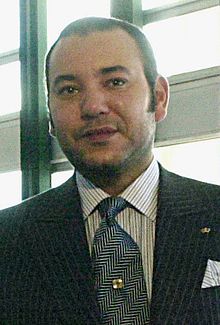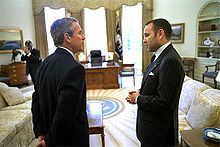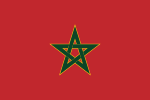- Mohammed VI of Morocco
-
Mohammed VI
محمد السادس
King of Morocco Reign 23 July 1999 – present Predecessor Hassan II Heir apparent Moulay Hassan Prime Ministers Spouse Salma Bennani Issue Moulay Hassan
Lalla KhadijaHouse House of Alaouite Father Hassan II Mother Lalla Latifa Hammou Born 21 August 1963
Rabat, MoroccoReligion Sunni Islam Mohammed VI (Arabic: محمد السادس, born 21 August 1963)[1] is the present King of Morocco and Amir al-Mu'minin (commander of the faithful). He ascended to the throne on 23 July 1999 upon the death of his father.[2]
Contents
Education
On the day of his birth, he was appointed Heir Apparent and Crown Prince.[3] His father, King Hassan II, was keen on giving him a religious and political education from an early age. At the age of four, he started attending the Qur'anic school at the Royal Palace,[1] and received a religious and traditional education.
After primary and secondary studies at Royal College[which?] and after he received his Baccalaureate in 1981, Mohammed obtained in 1985 a Bachelor's degree in law at the College of law of the Mohammed V University at Agdal in Rabat. His research paper dealt with "the Arab-African Union and the Strategy of the Kingdom of Morocco in matters of International Relations".[1] He has also frequented the Imperial College and University of Rabat.[3] In the same year of 1985 he was appointed President of the Pan Arab Games and commissioned Colonel Major of the Royal Moroccan Army on 26 November, and Coordinator of the Offices and Services of the Royal Armed Forces until 1994.[3]
In 1987 he obtained his first Certificat d'Études Supérieures (CES) in political sciences and in July 1988 he obtained a Diplôme d'Études Approfondies DEA in public law.[1]
In November 1988 he trained in Brussels with Jacques Delors, then President of the European Commission.[1]
He obtained his doctorate in law (PhD) with distinction on 29 October 1993 from the French University of Nice Sophia Antipolis for his thesis on "EEC-Maghreb Relations".[1]
Mohammed was promoted to the rank of Major General on 12 July 1994, the same year he became President of the High Council of Culture and Commander-in-Chief of the Royal Moroccan Army until 1999, the year he succeeded his father on 23 July, being enthroned at Rabat on 30 July.[3]
He received an honorary degree (doctor honoris causa) from George Washington University on 22 June 2000 for his promotion of democracy in Morocco.
Social reform and liberalization
 Mohammed VI talks with U.S. President George W. Bush in Washington, 23 April 2002
Mohammed VI talks with U.S. President George W. Bush in Washington, 23 April 2002
Shortly after he took the throne, he addressed his nation via television, promising to take on poverty and corruption, while creating jobs and improving Morocco's human rights record. Mohammed VI is generally opposed by Islamist conservatives, and some of his reforms have angered fundamentalists. He also created a new family code, or Mudawana, which granted women more power.[4] The law came into effect in February, 2004.
In December 2010 Wikileaks published diplomatic cables which alleged high-level corruption involving the King himself.[5]
Royal Family of Morocco Mohammed VI also created the so-called Instance Equité et Réconciliation (IER), a commission, which was supposed to research human rights violations under Hassan II. The commission was however not allowed to report about human rights violations until 1999, when Mohammed was enthroned. This move was welcomed by many as a move towards democracy, but also criticized because reports of human rights violations could not name the perpetrators. According to human rights organisations, abuses still exist in Morocco.[6][7][8] The 2011 Moroccan protests were motivated by corruption and general discontentment towards politicians in general and by the desire of better life conditions motivated by the economic crisis. The King has answered the protesters with the promise of further reforms.
In a speech delivered on 9 March 2011 the King said that parliament would receive "new powers that enable it to discharge its representative, legislative, and regulatory mission". In addition to the powers of the judiciary being granted independence from the King. And the king announced that he was impaneling a committee of legal scholars to produce a draft constitution by June.[9]
On July 1 voters approved a set of political reforms that the King proposed. The reforms consisted of the following:[10]
- The state preserves and protects the Hassānīya language and all the linguistic components of the Moroccan culture as a heritage of the nation[12]
- The king has the obligation to appoint a prime minister from the party that wins the most seats in the parliamentary elections. Previously, he could nominate a technocrat in this position if no party has a decisive advantage, over the other parties, in terms of the number of seats in the parliament.[10][13][14]
- The king is no longer "sacred" but the "integrity of his person" is "inviolable" [15]
- High administrative and diplomatic posts (including ambassadors, CEOs of state-owned companies, provincial and regional governors), are now appointed by the prime minister and the ministerial council which is presided by the king, previously the latter exclusively held this power. [16][17]
- The prime minister is the head of government and president of the council of government, he has the power to dissolve the parliament.[18]
- The prime minister will preside over the council of Government, which prepares the general policy of the state. Previously the king held this position.[18]
- The parliament has the power of granting amnesty. Previously this was exclusively held by the king [19]
- The judiciary system is independent from the legislative and executive branch, the king guarantees this independence[20][18]
- Women are guaranteed "civic and social" equality with men. Previously, only "political" equality was guaranteed, though the 1996 constitution grants all citizens equality in terms of rights and before the law[14]
- The King would retain complete control of the armed forces, foreign policy and the judiciary;[21] authority for choosing and dismissing prime ministers[22] and he would retain control of matters pertaining to religion.
- All citizens have the freedom of: thought, ideas, artistic expression and creation. Previously only free-speech and the freedom of circulation and association were guaranteed.[23] [14]
Wealth
Until recently the king and his family held stock in the ONA Group, a holding company with a diverse portfolio (mining, food processing, retail and financial services, etc.), although a new constitutional implementation disallowed this. Mohammed is estimated by Forbes magazine to be worth $2 billion and the Moroccan Royal Family has one of the largest fortunes in the world. His palace's daily operating budget is reported by Forbes to be $960,000, owing much of it to the expense of clothes and car repair.[24]
Family
Mohammed, who was born in Rabat, has one brother, Prince Moulay Rachid, and three sisters, Princess Lalla Meryem, Princess Lalla Asma, and Princess Lalla Hasna.
On 21 March 2002 in Rabat,[3] he married Salma Bennani (now H.R.H. Princess Lalla Salma) in Rabat, and she was granted the personal title of Princess with the style of Her Royal Highness on her marriage. They have two children, Crown Prince Moulay Hassan, who was born on 8 May 2003, and Princess Lalla Khadija, who was born on 28 February 2007.[4]
Decorations
Include:
 Grand Officer of the Order of the Equatorial Star of Gabon (7 July 1977)
Grand Officer of the Order of the Equatorial Star of Gabon (7 July 1977) Grand Cross of the Royal Victorian Order of Great Britain and Northern Ireland (27 October 1980)
Grand Cross of the Royal Victorian Order of Great Britain and Northern Ireland (27 October 1980) Grand Cross of the Order of the Chrysanthemum of Japan (7 March 1987)
Grand Cross of the Order of the Chrysanthemum of Japan (7 March 1987) Grand Cross of the Order of the Republic of Tunisia (x August 1987)
Grand Cross of the Order of the Republic of Tunisia (x August 1987) Grand Cross of the Order of Merit of the Italian Republic of Italy (18 March 1997) with Collar (11 April 2000)
Grand Cross of the Order of Merit of the Italian Republic of Italy (18 March 1997) with Collar (11 April 2000) Collar of the Order of Hussein ibn 'Ali of Jordan (x March 2000)
Collar of the Order of Hussein ibn 'Ali of Jordan (x March 2000) Grand Collar of the Order of the Seventh of November of Tunisia (x May 2000)
Grand Collar of the Order of the Seventh of November of Tunisia (x May 2000) Grand Cross of the Legion of Honour of France (19 March 2000)
Grand Cross of the Legion of Honour of France (19 March 2000) Grand Cross of the Order of National Merit of Mauritania (x April 2000)
Grand Cross of the Order of National Merit of Mauritania (x April 2000) Grand Cross of the National Order of Mali of Mali with Collar (14 June 2000)
Grand Cross of the National Order of Mali of Mali with Collar (14 June 2000) Grand Cross of the Order of Isabella the Catholic of Spain with Collar (16 September 2000)
Grand Cross of the Order of Isabella the Catholic of Spain with Collar (16 September 2000) Grand Cross of the Order of Oumayid of Syria (9 April 2001)
Grand Cross of the Order of Oumayid of Syria (9 April 2001) Grand Cross of the Order of Merit of the Lebanon of the Lebanon Special Class (13 June 2001)
Grand Cross of the Order of Merit of the Lebanon of the Lebanon Special Class (13 June 2001) Grand Cross of the Order of Abu Bakar Siddiq of the International Red Cross and Red Crescent Movement (29 June 2001)
Grand Cross of the Order of Abu Bakar Siddiq of the International Red Cross and Red Crescent Movement (29 June 2001) Grand Collar of the Order of al-Khalifa of Bahrain (28 July 2001)
Grand Collar of the Order of al-Khalifa of Bahrain (28 July 2001) Collar of the Order of Mubarak the Great of Kuwait (22 October 2002)
Collar of the Order of Mubarak the Great of Kuwait (22 October 2002) Grand Cross of the Order of the Independence of Qatar (25 October 2002)
Grand Cross of the Order of the Independence of Qatar (25 October 2002) Grand Cross of the Order of the Nile of Egypt (28 October 2002)
Grand Cross of the Order of the Nile of Egypt (28 October 2002) Grand Cross of the Order of Pakistan First Class (Nishan-e-Pakistan) of Pakistan (19 July 2003)
Grand Cross of the Order of Pakistan First Class (Nishan-e-Pakistan) of Pakistan (19 July 2003) Grand Cross of the Order of Valour of the Cameroon of the Cameroon (17 June 2004)
Grand Cross of the Order of Valour of the Cameroon of the Cameroon (17 June 2004) Grand Cross of the Order of the Equatorial Star of Gabon (21 June 2004)
Grand Cross of the Order of the Equatorial Star of Gabon (21 June 2004) Grand Cross of the National Order of the Niger of the Niger (24 June 2004)
Grand Cross of the National Order of the Niger of the Niger (24 June 2004) Grand Cross of the Order of Leopold I of Belgium (5 October 2004)
Grand Cross of the Order of Leopold I of Belgium (5 October 2004) Grand Collar of the Order of the Southern Cross of Brazil (26 November 2004)
Grand Collar of the Order of the Southern Cross of Brazil (26 November 2004) Medal of Honour of the Congress of Peru of Peru (1 December 2004)
Medal of Honour of the Congress of Peru of Peru (1 December 2004) Grand Collar of the Order of Bernardo O'Higgins of Chile (3 December 2004)
Grand Collar of the Order of Bernardo O'Higgins of Chile (3 December 2004) Grand Collar of the Order of the Liberator General San Martin of Argentina (7 December 2004)
Grand Collar of the Order of the Liberator General San Martin of Argentina (7 December 2004) Grand Collar of the Order of the Aztec Eagle of Mexico (11 February 2005)
Grand Collar of the Order of the Aztec Eagle of Mexico (11 February 2005) Grand Cross of the Order of Burkinabé of Burkina Faso (1 March 2005)
Grand Cross of the Order of Burkinabé of Burkina Faso (1 March 2005) Collar of the Order of the Chrysanthemum of Japan (28 November 2005)
Collar of the Order of the Chrysanthemum of Japan (28 November 2005) Grand Cross of the Order of the Republic of The Gambia (20 February 2006)
Grand Cross of the Order of the Republic of The Gambia (20 February 2006) Grand Cross of the Order of Merit of the Congo of the Congo-Brazzaville (22 February 2006)
Grand Cross of the Order of Merit of the Congo of the Congo-Brazzaville (22 February 2006) Grand Cross of the Order of the National Heroes of the Democratic Republic of the Congo of Congo-Kinshasa (28 February 2006)
Grand Cross of the Order of the National Heroes of the Democratic Republic of the Congo of Congo-Kinshasa (28 February 2006)
Styles
Royal styles of
King Mohammed VI of Morocco
Reference style His Majesty Spoken style Your Majesty Alternative style Sir The official style of the King is His Majesty the King Mohammed the Sixth, Commander of the Faithful, may God grant him victory (صاحب الجلالة الملك محمد السادس أمير المؤميني نصره الله Ṣāḥib al-Jalālah al-Malik Muḥammad al-Sādis, 'Amīr al-Mu'minīn, Naṣṣarahu-Illāh). In contexts wherein he is executing a duty regarding the Royal Moroccan Armed Forces, he is generally entitled the "Commander-in-Chief."
References
- ^ a b c d e f "King Mohammed Ben Al-Hassan". Embassy of the Kingdom of Morocco. http://dcusa.themoroccanembassy.com/moroccan_embassy_political_system_the_king.aspx. Retrieved 18 February 2010.
- ^ "World: Africa Mohammed VI takes Moroccan throne". BBC News. 24 July 1999. http://news.bbc.co.uk/1/hi/world/africa/402712.stm. Retrieved 18 February 2010.
- ^ a b c d e http://www.royalark.net/Morocco/morocco14.htm
- ^ a b "Morocco country profile". BBC News. 16 December 2009. http://news.bbc.co.uk/1/hi/world/africa/country_profiles/791867.stm. Retrieved 18 February 2010.
- ^ Black, Ian (6 December 2010). "WikiLeaks cables accuse Moroccan royals of corruption". London: The Guardian. http://www.guardian.co.uk/world/2010/dec/06/wikileaks-cables-morocco-royals-corruption. Retrieved 16 June 2011.
- ^ MacFarquhar, Neil (1 October 2005). "In Morocco, a Rights Movement, at the King's Pace". New York Times. http://www.nytimes.com/2005/10/01/international/africa/01morocco.html?pagewanted=print. Retrieved 18 February 2010.
- ^ Harter, Pascale (19 April 2005). "Facing up to Morocco's hidden fear". BBC News. http://news.bbc.co.uk/1/hi/world/africa/4457267.stm. Retrieved 18 February 2010.
- ^ "Morocco/Western Sahara: Amnesty International welcomes public hearings into past violations". Amnesty International. http://www.amnestyusa.org/document.php?lang=e&id=80256DD400782B8480256F6A003CF643. Retrieved 18 February 2010.
- ^ Mohammed VI speech
- ^ a b BBC News, June 29, 2011, "Q&A: Morocco's referendum on reform" http://www.bbc.co.uk/news/world-africa-13964550
- ^ A standardized version of the 3 native Berber languages of Morocco: Tachelhit, Central Atlas Tamazight and Tarifit.
- ^ a b Article 5 of the 2011 Moroccan constitution
- ^ Article 47 of the 2011 Moroccan constitution
- ^ a b c 1996 Moroccan constitution
- ^ Article 46 of the 2011 Moroccan constitution
- ^ Article 91 of the 2011 Moroccan constitution
- ^ Article 49 of the 2011 Moroccan constitution
- ^ a b c AFP. "Maroc: la réforme constitutionnelle préconise de limiter certains pouvoirs du roi". Parisien. http://www.leparisien.fr/flash-actualite-monde/maroc-la-reforme-constitutionnelle-preconise-de-limiter-certains-pouvoirs-du-roi-17-06-2011-1498052.php. Retrieved 24 August 2011.
- ^ Article 71 of the 2011 Moroccan constitution
- ^ Article 107 of the 2011 Moroccan constitution
- ^ Voice of America, July 30, 2011 "Moroccan King Calls for Prompt Parliamentary Elections" http://www.voanews.com/english/news/africa/Moroccan-King-Calls-for-Prompt-Parliamentary-Elections-126457118.html
- ^ Canada Free Press, August 18, 2011 "Arab Royal Houses Seek Affordable Medicines" http://canadafreepress.com/index.php/article/39565
- ^ Driss Bennani, Mohammed Boudarham and Fahd Iraqi. "nouvelle constitution. plus roi que jamais". Telquel. http://www.telquel-online.com/479/couverture_479.shtml. Retrieved 24 August 2011.
- ^ Pendleton, Devon; Serafin, Tatiana. "In Pictures: The World's Richest Royals". Forbes. http://www.forbes.com/2007/08/30/worlds-richest-royals-biz-royals07-cx_lk_0830royalintro_slide_8.html?thisSpeed=30000.
External links
- Morocco Alaoui dynasty
- History of Morocco
- King Mohammed VI Grants Exclusive First-ever Interview to Time
- Laurenson, John. The most powerful man in Morocco, BBC News, 11 March 2006.
- King Mohammed's luxury car collection
- Constitutional Reform in Morocco: I Am the Reform!
Mohammed VIBorn: 21 August 1963Regnal titles Preceded by
Hassan IIKing of Morocco
1999–presentIncumbent
Heir apparent:
Moulay HassanCategories:- 1963 births
- Alaouite dynasty
- Arab politicians
- Current national leaders
- Honorary Knights Grand Cross of the Royal Victorian Order
- Kings of Morocco
- Living people
- North African royalty
- Recipients of the Order of the Three Stars, 1st Class
- Reigning monarchs
Wikimedia Foundation. 2010.

